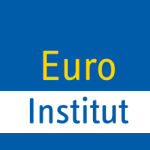Présentation du projet :
Le projet « Conflits et coopérations dans les régions frontalières de l’UE (EU-Front) » vise à l’échange d’expérience et au débat sur le rôle de la frontière dans le processus d’intégration européenne. L’idée est d’examiner la frontière dans sa fonction dialectique de séparation et de rapprochement et d’en débattre les conséquences pour l’Union européenne. Concrètement, le projet consiste en l’organisation, à Strasbourg, de 4 de tables rondes et de 4 séminaires-débats dont le dernier sera élargi à une conférence finale. Chaque table-ronde traite d’un problème d’actualité aux frontières (crise d’immigration, retour des contrôles aux frontières, etc.) et chaque séminaire examine deux régions transfrontalières pour une analyse comparative au total de huit cas d’études en Europe : l’espace du Rhin supérieur (France, Allemagne, Suisse), l’espace Mont Blanc (France, Suisse, Italie), l’espace Manche et l’Eurométropole Lille (France, Belgique, Royaume-Uni), l’espace Irlande du Nord-Irlande, la région Cieszyn (République tchèque, Pologne), l’eurorégion Viadrina (Allemagne, Pologne), l’espace catalan (Espagne, France, Andorre) et la région Slovénie-Autriche-Italie. Le choix de ces régions se justifie par l’assurance d’une représentativité sur le plan géographique (frontières intérieures et extérieures, Schengen) et thématique (problèmes migratoires, criminalité transfrontalière, réconciliation franco-allemande, coopération Est-Ouest, euro-métropoles, etc.). Les débats et l’analyse comparative seront interdisciplinaires et associeront des chercheurs, doctorants, étudiants européens et internationaux, mais aussi des acteurs transfrontaliers (au niveau politique et administratif) ainsi que des représentants des organisations européennes (Conseil de l’Europe, Parlement européen, Comité des régions). Le projet aboutira à l’élaboration d’une encyclopédie sur les conflits et coopérations aux frontières de l’UE qui s’adresse à la fois aux étudiants en Relations internationales et Etudes européennes et aux acteurs dans les territoires transfrontaliers.
English :
The project “Conflict and cooperation in EU Border Regions (EU-Front)” aims at an exchange of experience and debate on the role of the border in the process of European Integration. The idea is to examine the border in its dialectical function between separation and rapprochement and to discuss the consequences of this for the European Union. Concretely, the project consists in the organization of 4 round-tables and 4 seminar-debates the last one of which will be enlarged into a final Conference. Each round-table will deal with a current border problem (immigration crisis, the reintroduction of border controls etc.) and each seminar will examine two cross-border regions for a comparative analysis of eight case studies in total: the Upper Rhine Region (France, Germany, Switzerland), the Mont Blanc Space (France, Switzerland, Italy), the Calais-Dover Region and Eurometropolis Lille (France, Belgium, United Kingdom), the Region Ireland/Northern Ireland, the Cieszyn Region (Czech Republic, Poland), the Euroregion Viadrina (Germany, Poland), the Catalan Region (Spain, France, Andorra) and the Slovenia-Austria-Italy Border Region. The choice of these regions is justified by a representativeness both in geographical (internal and external borders, Schengen) and policy field terms (migration problems, cross-border crime, Franco-German reconciliation, East-West cooperation, Euro-metropoles, etc.). The debates and the comparative analysis will be interdisciplinary and will associate researchers, PHD students, European and International students, but also cross-border actors (at political and administrative level) and representatives of European Organizations (Council of Europe, European Parliament, Committee of Regions). The project will lead to the elaboration of an Encyclopaedia on conflict and cooperation at EU borders for a public of students in International Relations and European Studies and for actors in cross-border territories.



